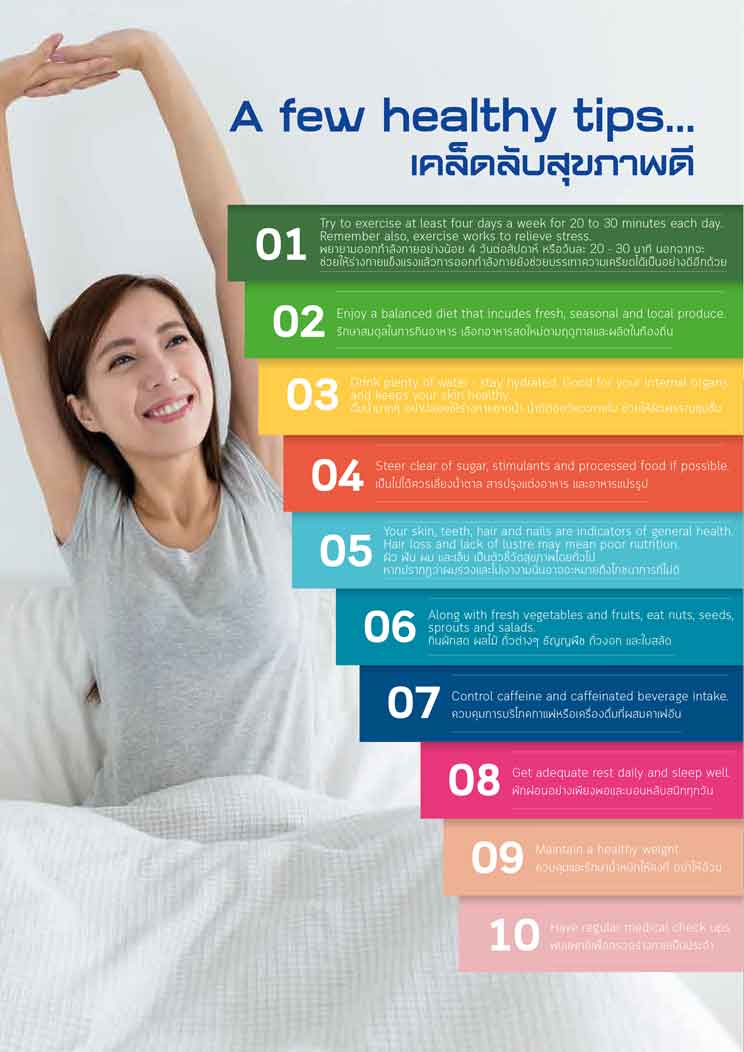
Are we feeling better today…or worse?
Hello again, and welcome to Health Matters from Pacific Cross Health Insurance PCL.
I hope you are enjoying the articles we select, and are benefiting from the information they provide. Take particular note of the article regarding alternative medicine. I believe this is a sensible way forward in terms of preventive care using healthy, natural ingredients, though do check with us first regarding your health insurance coverage should you decide to engage in this form of treatment.
Read on, and as always, make sure you and your family enjoy a happy, healthy lifestyle.
Are we feeling better today…or worse?
Tired of leaving the pharmacy with packets of unidentifiable tablets, pills and bottles of medicine that have just cost a lot of money and may or may not cure the problem?
Especially when living in regions of unclear medical care and attention and possible language or communication difficulties, we are sometimes unsure of precisely what we and our families are being prescribed, what it consists of in terms of chemical content, and of course the expense of large quantities of perhaps unnecessary and unsafe medicine.
It may be worth considering a different course of action in the form of preventive care using alternative medicine that consists of only healthy, natural ingredients.
Why not choose an alternative to usual medications, such as diabetes medications and injections, cholesterol lowering medicines and statins? Why not get rid of all side-effects of such medications?
There are companies dedicated to the continual development of the highest quality nutritional and personal care products in the world, using only formulas and ingredients that are effective, complete, balanced, and safe. Their products are based upon solid scientific research, and have achieved and published positively reviewed clinical studies backing their effectiveness.
Alternative medicine may well be destined to revolutionize the preventive care industry, making you and yours feel better and healthier, faster, so it seems well worth looking into…
If you are interested in receiving further information or advice in English or Thai, please call 0-2401-9189
Alzheimer’s and dementia – What’s the difference?
Dementia and Alzheimer’s disease may share many of the same symptoms, but the two are not different names for the same condition. Dementia is a syndrome, or a group of symptoms that consistently occur together. It is not a specific disease. The term “dementia” is used to describe a set of symptoms that can include memory loss, difficulty thinking, problem solving, or issues with language. Dementia is caused by damage to the brain cells, and because Alzheimer’s is a disease that destroys the brain, it is one of the most common causes of dementia.
The major difference between Alzheimer’s Disease and dementia? When an individual is diagnosed with dementia, they are diagnosed based on their symptoms without actually knowing what’s behind the symptoms. With Alzheimer’s disease, the exact cause of the symptoms is understood. In addition, Alzheimer’s disease is not reversible, whereas some types of dementia, such as those caused by nutritional problems or drug interaction, can be reversed.
Diet adjustment can reduce the risk of Alzheimer’s and dementia while improving attention, memory, and language skills. Elderly people who eat plenty of fish, lean meat, legumes, nuts, whole grains, fruits, vegetables and healthy fats may benefit from better brain health. Researchers believe that a change of diet could be an essential tool to maintain quality of life, therefore reducing the potential risks of decline in mental awareness such as Alzheimer’s and dementia.
Long Asian days can mean lots of hot weather and the need for carefully applied sun protection.
Sunscreen protects our skin by either physically deflecting UV rays’ active ingredients, or chemically with carbon-based compounds. When choosing a sunscreen we must compare application methods, the SPF (sun protection factor,) and the active ingredients.
Sprays are convenient to put on, especially when we’re wet, but be sure to apply a thick enough layer to enable full protection, and take care as inhaling spray chemicals may also expose you to several health risks.
A bottle of lotion with an SPF of at least 15 is recommended, although 30 is better. SPF 15 blocks 93 percent of UVB rays, SPF 30 blocks 97 percent, and SPF 50 blocks 98 percent. Remember, when, where, and how you spend your time in the sun will determine how much time you have before you start to burn.
Sun protection factor measures a sunscreen’s ability to filter UVB rays, linked to sunburn and skin cancer. However, SPF only measures UVB rays, and doesn’t protect from you UVA rays. Unlike UVB, UVA is not filtered by ozone and doesn’t cause sunburn, but can lead to darkening and aging because of its ability to penetrate deeper into the skin. A way to determine whether your sunscreen protects against UVA rays is to check if it includes the words “broad spectrum” – the most important thing to look for on a sunscreen label. Taking the time to read the label could make a difference between getting a tan and getting sunburn. When reading a lotion label, remember SPF is on the front, and on the back are the active ingredients such as zinc oxide, or titanium dioxide, and carbon-based chemicals.

A few healthy tips…
Enjoy a balanced diet that incudes fresh, seasonal and local produce
Drink plenty of water – stay hydrated. Good for your internal organs and keeps your skin healthy
Control caffeine and caffeinated beverage intake
Steer clear of sugar, stimulants and processed food if possible
Along with fresh vegetables and fruits, eat nuts, seeds, sprouts and salads.
Maintain a healthy weight
Try to exercise at least four days a week for 20 to 30 minutes each day. Remember also, exercise works to relieve stress
Get adequate rest daily and sleep well
Your skin, teeth, hair and nails are indicators of general health. Hair loss and lack of lustre may mean poor nutrition
Have regular medical check ups

